Related Research Articles
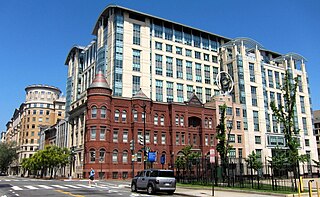
The National Academies of Sciences, Engineering, and Medicine is a congressionally chartered organization that serves as the collective scientific national academy of the United States. The name is used interchangeably in two senses: (1) as an umbrella term or parent organization for its three sub-divisions that operate as quasi-independent honorific learned society member organizations known as the National Academy of Sciences (NAS), the National Academy of Engineering (NAE), and the National Academy of Medicine (NAM); and (2) as the brand for studies and reports issued by the unified operating arm of the three academies originally known as the National Research Council (NRC). The National Academies also serve as public policy advisors, research institutes, think tanks, and public administration consultants on issues of public importance or on request by the government.

The National Academy of Sciences (NAS) is a United States nonprofit, non-governmental organization. NAS is part of the National Academies of Sciences, Engineering, and Medicine, along with the National Academy of Engineering (NAE) and the National Academy of Medicine (NAM).
Arms control is a term for international restrictions upon the development, production, stockpiling, proliferation and usage of small arms, conventional weapons, and weapons of mass destruction. Arms control is typically exercised through the use of diplomacy which seeks to impose such limitations upon consenting participants through international treaties and agreements, although it may also comprise efforts by a nation or group of nations to enforce limitations upon a non-consenting country.
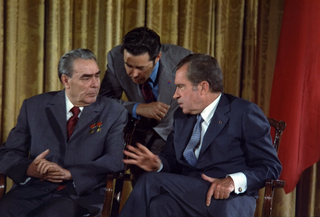
Détente is the relaxation of strained relations, especially political ones, through verbal communication. The diplomacy term originates from around 1912, when France and Germany tried unsuccessfully to reduce tensions.
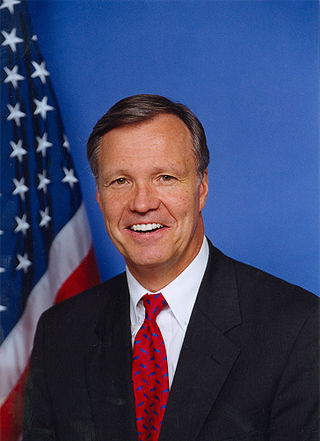
The Report of the Select Committee on U.S. National Security and Military/Commercial Concerns with the People's Republic of China, commonly known as the Cox Report after Representative Christopher Cox, is a classified U.S. government document reporting on the People's Republic of China's covert operations within the United States during the 1980s and 1990s. The redacted version of the report was released to the public on May 25, 1999.

The Peace Research Institute Oslo is a private research institution in peace and conflict studies, based in Oslo, Norway, with around 100 employees. It was founded in 1959 by a group of Norwegian researchers led by Johan Galtung, who was also the institute's first director (1959–1969). It publishes the Journal of Peace Research, also founded by Johan Galtung.

The International Progress Organization (IPO) is a Vienna-based think tank dealing with world affairs. As an international non-governmental organization (NGO) it enjoys consultative status with the Economic and Social Council of the United Nations and is associated with the United Nations Department of Public Information. The organization aims at promoting peaceful co-existence among all nations, in particular the dialogue among civilizations; a just international economic order; global respect for human rights; and the international rule of law. The IPO has members in more than 70 countries on all continents and organizes conferences and expert meetings on issues of conflict resolution, civilizational dialogue, international law, and United Nations reform. The organization publishes the series Studies in International Relations and monographs in the field of international relations theory.
Paul Mead Doty was Mallinckrodt Professor of Biochemistry at Harvard University, specializing in the physical properties of macromolecules and strongly involved in peace and security policy issues.
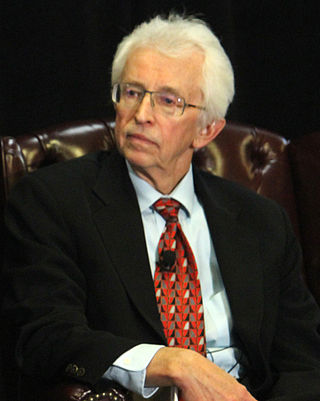
Siegfried S. Hecker is an American metallurgist and nuclear scientist. He served as Director of the Los Alamos National Laboratory from 1986 to 1997 and is now affiliated with Stanford University, where he is research professor emeritus in the Department of Management Science and Engineering in the School of Engineering, and senior fellow emeritus at the Freeman Spogli Institute for International Studies. During this time, he was also elected a member of the National Academy of Engineering (1988) for outstanding research on plutonium and the forming of materials, and for leadership in developing energy and weapons systems.
CISAC may refer to:
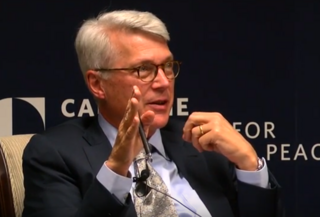
Scott Douglas Sagan is the Caroline S.G. Munro Professor of Political Science at Stanford University and co-director of Stanford's Center for International Security and Cooperation (CISAC). He is known for his research on nuclear weapons policy and nuclear disarmament, including discussions of system accidents, and has published widely on these subjects.

Gloria Charmian Duffy is a former U.S. Department of Defense official, businesswoman, social entrepreneur and nonprofit executive. Since 1996, she has been the president, CEO and a member of the Board of Governors of the Commonwealth Club of California, America's largest and oldest public forum, founded in 1903. From 2010 to 2017 she led the acquisition, financing, design, entitlements and construction of the club's first headquarters building, at 110 The Embarcadero in San Francisco. The grand opening for the club's new building took place on September 12, 2017. The building received a 2016 California Heritage Council award for historic preservation.

The Dartmouth Conference is the longest continuous bilateral dialogue between American and Soviet representatives. The first Dartmouth Conference took place at Dartmouth College in 1961. Subsequent conferences were held through 1990. They were revived in 2014 and continue today. Task forces begun under the auspices of the main conference continued to work after the main conference stopped. The Regional Conflicts Task Force extended the sustained dialogue model, based on the Dartmouth experience, to conflicts in Tajikistan and Nagorno-Karabakh. Dartmouth inspired a number of other dialogues in the former Soviet Union and elsewhere, many of them under the auspices of the Sustained Dialogue Institute and the Kettering Foundation.
The International Luxembourg Forum on Preventing Nuclear Catastrophe — is an international non-governmental organisation uniting leading world-renowned experts on non-proliferation of nuclear weapons, materials and delivery vehicles.

Mariano-Florentino "Tino" Cuéllar is an American scholar, academic leader, public official, jurist, and nonprofit executive currently serving as the 10th president of the Carnegie Endowment for International Peace. He was previously a Justice of the Supreme Court of California and an executive branch official in the Clinton and Obama administrations, the Stanley Morrison Professor of Law at Stanford University, director of Stanford's Freeman Spogli Institute for International Studies, and co-chair of the U.S. Department of Education's Equity and Excellence Commission. His publications address problems in American public law, international affairs and international law, artificial intelligence, public health and safety law, and institutions and organizations. He was elected to the President and Fellows of Harvard College in February 2019 and serves as chair of the board of the William and Flora Hewlett Foundation. He was born in Northern Mexico.
George Bunn was an American diplomat, lawyer, and nonproliferation expert. He drafted the legislation that created the U.S. Arms Control and Disarmament Agency (ACDA), was one of the lead U.S. negotiators of the nuclear Nonproliferation Treaty (NPT), served as Dean of the law school at the University of Wisconsin–Madison, and spent the last two decades of his career at the Center for International Security and Cooperation at Stanford University.

Dr. Alexei Georgievich Arbatov, PhD is a full member of the Russian Academy of Sciences, the Head of the Center for International Security at the Institute of World Economy and International Relations (IMEMO), and a scholar in residence at the Carnegie Moscow Center. He is a Russian political scientist, academic, author, and former politician.
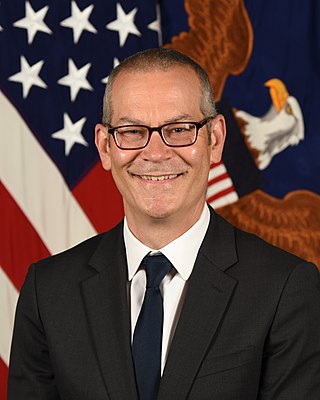
Colin Hackett Kahl is an American government official and academic who has served as Under Secretary of Defense for Policy in the administration of President Joe Biden since April 28, 2021. Previously, he served as National Security Advisor to the Vice President under then-Vice President Joe Biden (2014–2017). After the Obama Administration, Kahl served as a Steven C. Házy Senior Fellow at Stanford University.
Janne E. Nolan was an American academic, foreign policy advisor, and expert on nuclear arms control and nonproliferation. She held senior positions in the Department of State, as a staffer for the Senate, and served on multiple blue ribbon commissions. She was well known for supporting generations of women in the traditionally male dominated field of nuclear security.

Charles Russell "Charlie" Miller is a United States Army major general who has served as Director, Strategy, Plans and Policy of the Army Staff since July 2022. He most recently served as the Director for Plans, Policy, Strategy, and Capabilities of the United States European Command from July 2020 to June 2022, and prior to that, he served as the Deputy Director of Joint Strategic Planning, Strategy, Plans, and Policy of the Joint Staff from July 2019 to July 2020.
References
- ↑ "Official website". Committee on International Security and Arms Control. Retrieved 2023-06-16.
- ↑ "International Security & Arms Control Committee Celebrates 25th Anniversary During World Year of Physics". American Physical Society . Retrieved May 6, 2011.
- ↑ "Dialogues". Committee on International Security and Arms Control. Retrieved May 6, 2011.
- ↑ "Committee on International Security and Arms Control (NAS)". American Association for the Advancement of Science . Retrieved May 6, 2011.